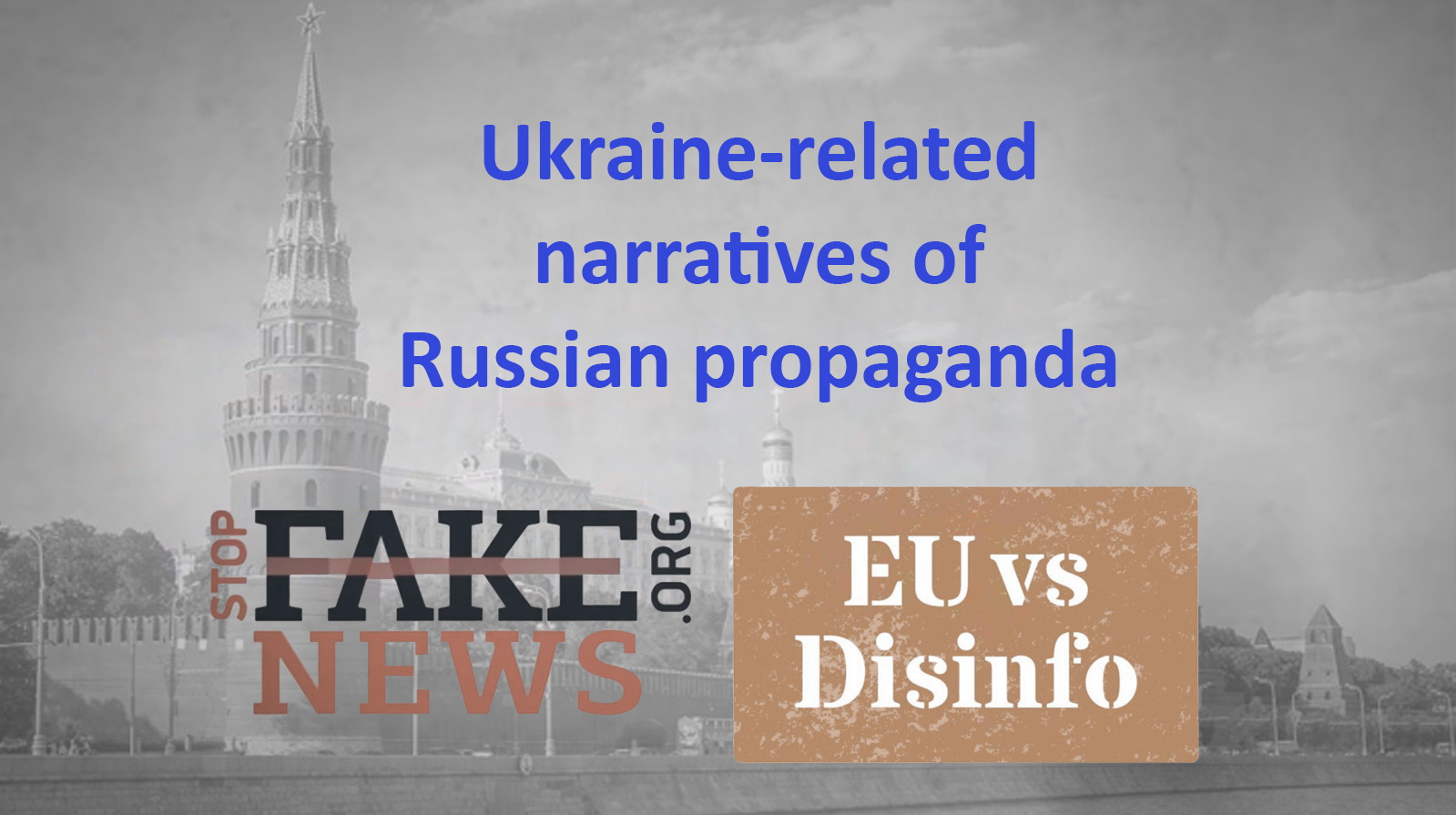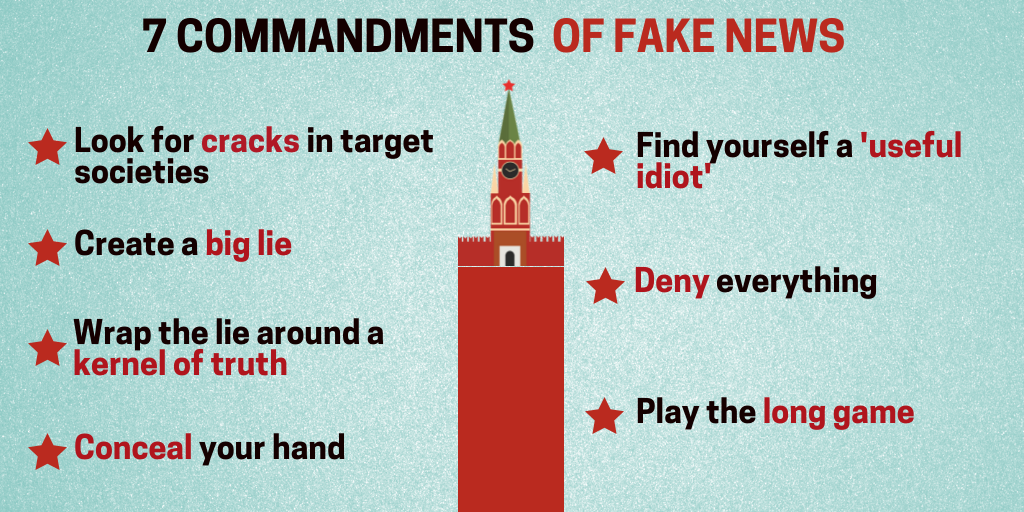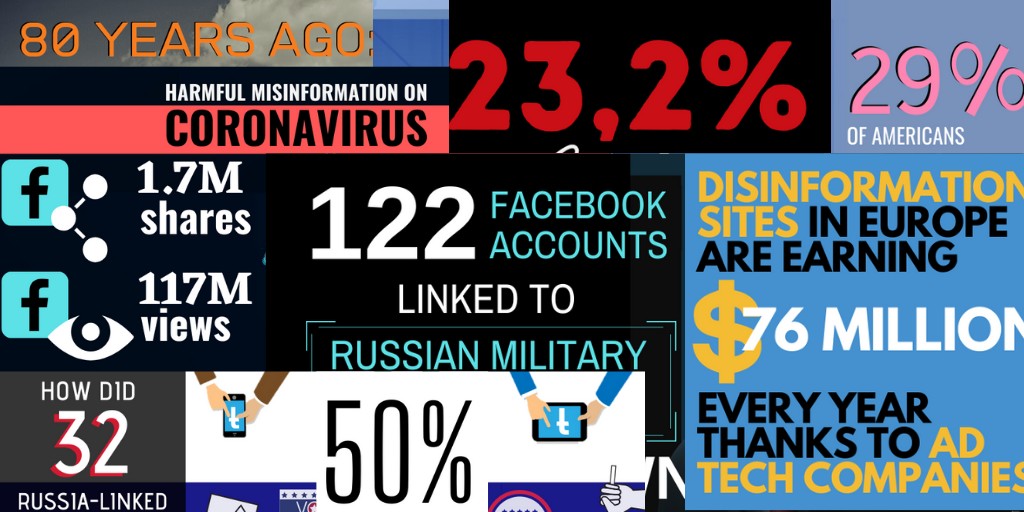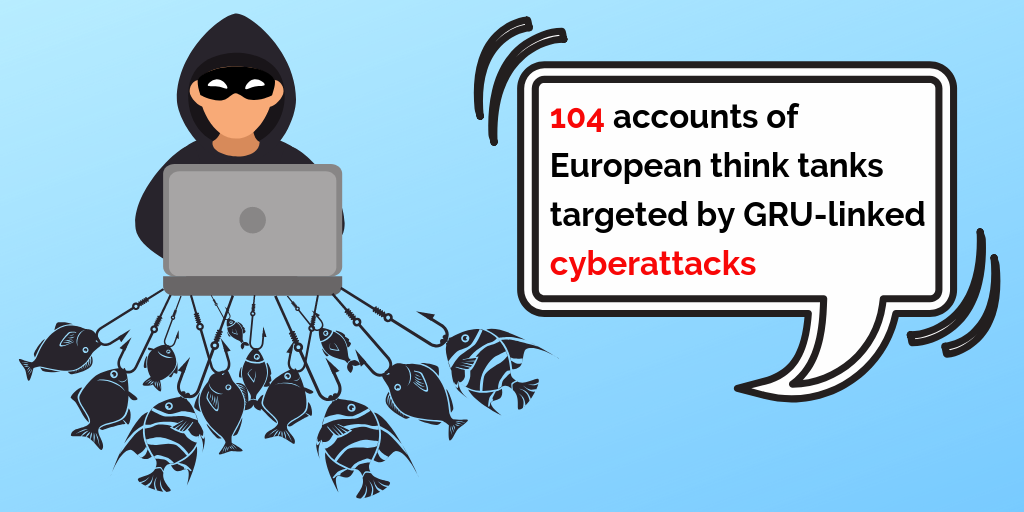At publishing time, the online database of EU vs Disinfo contains 4,564 disinformation cases. The agency has been collecting and debunking the fake news and propaganda stories since 2015. Most of the items in the database are disinformation stories spread by Russian news reports and on TV shows. Ukraine has been the key focal point of Russian propaganda.
The latest statistics of the disinformation cases registered by the European External Action Service East Stratcom Task Force.
About 40% of the cases in the EU vs Disinfo database are Ukraine-related:
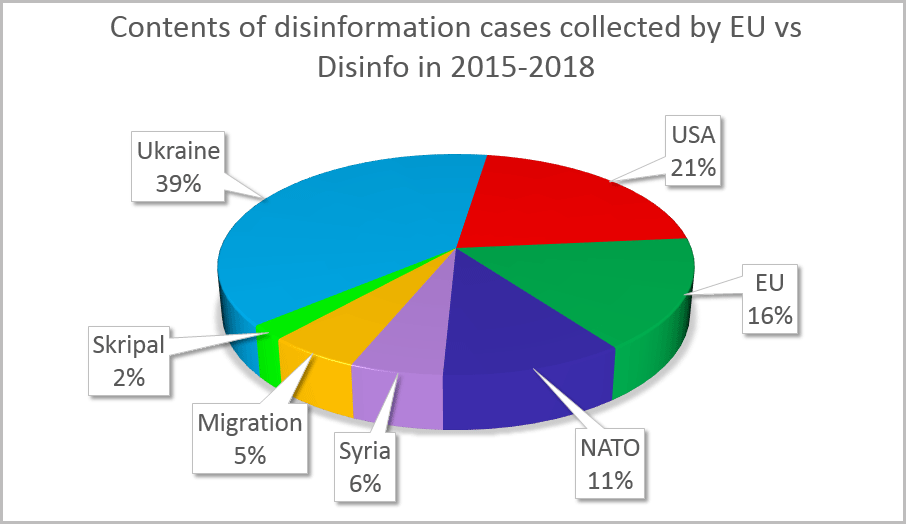
The ratio of the narratives most used in Russian disinformation. Note: less popular topics omitted, thus other figures might become slightly bigger on the diagram.
Sources of Ukraine-related fakes
StopFake identified 178 media outlets as the sources of fake stories. Russian media were the absolute leaders on the list (85 media outlets out of 178), additionally, 20 more outlets were located in the Russian-run Luhansk and Donetsk "people's republics," the news of which are often uncritically spread by the Russian press. 34 outlets from Ukraine and 39 from other countries were the other spreaders of fakes.
StopFake stresses, "A significant number of media outlets from other countries are represented by Czech, Hungarian, and Slovakian news websites; Hence, we can say that Russian propaganda functions in a full-scale distribution ‘ecosystem’ of untruthful information."
The external ramifications of the ecosystem include a Russia-affiliated network of media outlets and Russia's support for alternative media outlets and NGOs in foreign countries. The domestic part includes numerous media organizations of various types, including state-run media, fake media run by the infamous Internet Research Agency a.k.a. the "Troll Factory" (like "Kharkiv News Agency" and Riafan) and so on.
According to StopFake, the leader in spreading anti-Ukrainian disinformation is Zvezda, the media holding by Russia's Defense Ministry. StopFake debunked 79 fake stories spread by Zvezda. The Kremlin-owned website Ukraina.ru (73 stories), part of the Russian state-owned Rossiya Segodnya media group, came in second place. The information agency RIA Novosti from the same Rossiya Segodnya was third, with 62 stories.
Among other leaders in spreading anti-Ukrainian disinformation, StopFake also named large TV channels such as Rossiya-24, RT, NTV, Channel 1, another state-controlled news agency TASS, newspapers Komsomolskaya Pravda and Izvestia, and popular online media Lenta.ru and Vzglyad.ru.
Topics of Ukraine-related narratives
Back in 2016, StopFake co-founder Yevhen Fedchenko identified 18 major Ukraine-related fake narrative topics spread by Russian propaganda by analyzing 500 debunked disinformation items.
- The Euromaidan Revolution as a "coup d’état"
- Ukraine as a "fascist state"
- Ukraine as a "failed state"
- "Russia is not a part of the occupation/war in Ukraine"
- Discrediting the Ukrainian Armed Forces (UAF)
- Discrediting the volunteer battalions (which officially became a part of UAF in 2015)
- Donbas and Crimean internally displaced persons (IDPs) and refugees
- Territorial disintegration of Ukraine
- "Territorial claims" for parts of Ukraine from neighboring Poland, Hungary, Romania, and Slovakia
- Fake "international legitimization" of annexation and occupation of Crimea
- The war in Ukraine "conducted by the US, NATO or Western private contractors"
- The West's "Ukraine fatigue"
- Manipulating international organizations
- Fakes about EU-Ukraine relations
- "Decay" of the US and West in general, and the "disintegration of the EU"
- Flight MH17 crash fakes
- The West "uses biological weapons" in Ukraine
- Mix-ups of the fake narratives about Ukraine, Syria, ISIS terrorists (e.g., Crimean Tatars being depicted as jihadists or Ukraine as a training ground for terrorists)
For post-Maidan Ukraine, Russian propaganda's most used narratives were the Euromaidan as "coup d’etat" which brought a "Western-backed junta" (mostly "US-backed") to power, and "fascism" as the main ideology of the post-Maidan government, Fedchenko notes.

Key Ukraine-related propaganda topics among 919 cases debunked by StopFake.
StopFake concludes that the fake news narratives show persistent efforts of Russian propaganda to create the image of Ukraine as a failed state by means of delegitimizing its armed forces, government, and state policies. Meanwhile, Ukrainian society is presented as such where ultraright opinions and groups are becoming more and more influential or even prevailing.
Read also:
- Wishful thinking as a manipulation tool in Russian propaganda
- “Russophobia” as a Russian propaganda tool
- Fake Western experts as a propaganda tool on Russian TV
- How pranksters are used as a pro-Kremlin propaganda tool
- Email chains and other Russia’s propaganda tools in central and eastern Europe
- How Russia uses dehumanizing disinformation as a weapon of the information war against Ukraine
- Irrelevant questions as a pro-Kremlin propaganda tool to distract the audience
- Kremlin disinformation campaign extremely successful – EU East Stratcom
- How Russian propaganda uses the victim-blaming strategy against Ukraine
- Intimidation as a propaganda tool in the Nordic countries
- Democracies should prepare for the long fight against Russian disinformation warfare: study
- Deception, Disinformation, and Doubt: Hybrid Warfare in Eastern Ukraine

